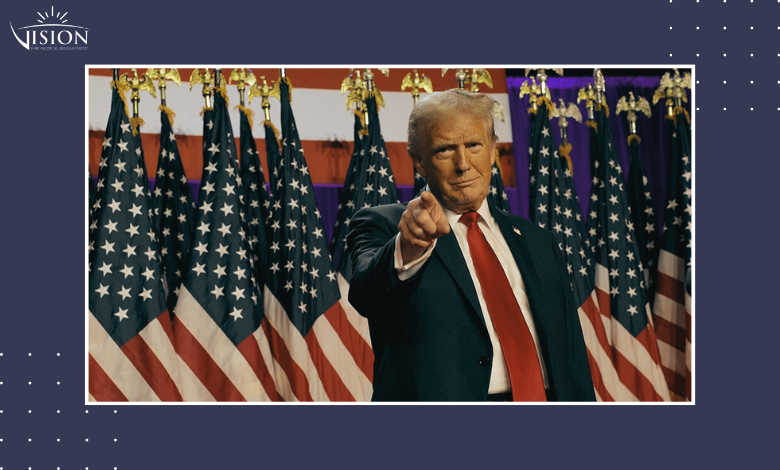Trump 2.0: The World Strikes Back

Hayyan Jaber
Donald Trump’s return to the U.S. presidency marks a significant departure from his first term. This time, he no longer benefits from the ‘element of surprise’ or the ability to push through swift, unpredictable decisions. His foreign policy ‘playbook’ has been widely exposed, allowing the international community to react and mobilize in a more effective and organized manner. Responses that were once scattered and isolated now appear more nuanced, strategic, and coordinated, as seen in the mirroring stances taken by Canada, Mexico, Ukraine, and several European nations. This growing alignment is likely to expand, potentially drawing in even more nations that seek to counter Trump’s agenda. In fact, what began as a reaction may, at some point, evolve into proactive measures, acquiring an organized and collective character—particularly within the framework of emergent global powers such as Brazil and South Africa, which do not align with any of the currently contending global blocs, namely the United States, the European Union, Russia, or China. The global influence of the United States is in visible decline, driven by a range of political, economic, and cultural factors. America’s soft power has weakened amidst the rise of alternative media platforms that challenge its traditional narrative dominance, while Hollywood’s cultural outreach and impact continues to fade. Economically, the supremacy of the U.S. dollar faces mounting pressure from the growing adoption of digital currencies and the expanding influence of the BRICS alliance. At the same time, America’s exploitative and morally compromised foreign policies—particularly its complicity in the Zionist-Israeli campaign of genocide against the Palestinian people—have eroded its credibility on the global arena; emboldened resistance against US policies, and encouraged countries to defy and challenge the ‘American will’. This disillusionment is reflected in the unresponsiveness and reluctance of many nations to heed the Biden administration’s calls, such as its appeal to form an international coalition against the Houthis in defense of the Zionist-Israeli occupation.Trump’s Brinkmanship and Confrontational Diplomacy
In addition to relying on the ‘shock factor’(element of surprise), Trump wields another decisive tactic in his diplomatic arsenal: brinkmanship. Instead of simply threatening direct confrontation—whether military or economic—Trump frequently takes tangible steps toward escalation. From his early days in office, he launched economic wars, signalling his readiness to engage in high-stakes maneuvers. His aggressive stance is evident in the threats extended to Ukraine, Russia, Iran (through military deployments in the Arab world and surrounding regions), China, the European Union, Yemen’s Houthi rebels, and of course, Palestine, among others. Trump’s rhetoric goes beyond mere threats; he has shown time and again that he is prepared to push the limits of confrontation; demonstrating both his capability and determination to pursue direct military confrontation, should the other party fail to comply. He warns of drastic measures—severance of intelligence-sharing with allies, suspending foreign aid, imposing sweeping sanctions, withdrawing from defense treaties and international agreements, and even dismantling international alliances. These boldly provocative statements underscore Trump’s unyielding resolve and readiness to escalate conflict to the highest possible level, no matter the consequences. It may be observed that so far the pre-emptive and corrective measures adopted by international stakeholders to counter Trump’s policies have done little to mitigate the risks of his high-stakes “brinkmanship.” If anything, these risks have only escalated. Trump’s approach has jeopardized global stability, as seen in his tense dealings with Ukrainian President Volodymyr Zelensky, and his confrontations with Canada, Panama, and Greenland. His aggressive tactics even extended towards Israel, reflected in the confrontational engagement with its Prime Minister before his inauguration. From Iran and the Houthis to Hamas and occasionally Russia, Trump’s combative stance has set the stage for escalating tensions across the globe. And this is just the beginning. The same confrontational tactics could soon be applied to the European Union, Australia, New Zealand, India, Japan, China, and a host of both allied and non-allied nations. Trump’s diplomatic style signals a future filled with unpredictable and dangerous confrontations. Trump’s policies no longer catch the world off guard; instead, they spark growing alarm and raise grave concerns. His threats bear the potential to turn into reality, bringing with them more destruction, losses, and increasingly grave repercussions. As a result, many countries have adopted a strategy of soft rejection, aiming to avoid full-blown escalation or direct confrontation. This is most visible in the increased calls for economic boycotts, which are gaining momentum across the globe, expanding both horizontally and vertically. Political confrontations mirror this approach, exemplified by Ukrainian President Zelensky, who has adopted a principled stance on prioritizing national autonomy, while repeatedly emphasizing his desire to negotiate an economic deal with the U.S. for access to precious metals. However, he is resolute in rejecting any agreement that would compromise Ukraine’s sovereignty, security, or burden future Ukrainian generations with crippling debt. Similar positions are echoed by Canada, Mexico, Greenland, Germany, France, and the UK, with the Egyptian and Jordanian regimes also showing a degree of alignment.Trump’s Confrontation Tactics Spark Political Reshuffling
Trump’s confrontation tactics have evolved into a political spectacle of their own, playing a pivotal role in reshaping the political landscape across various countries. In some instances, his aggressive stance has boosted the popularity of certain leaders, while significantly undermining the standing of others. This has been particularly evident in Canada, France, the UK, Mexico, and beyond. In Canada, for instance, the Liberal Party, under the faltering leadership of Justin Trudeau, experienced a sharp decline in approval ratings. A public opinion poll in July 2024 revealed the Liberals trailing with just 21% of the vote, compared to 43% for the Conservatives. By November of that year, the gap had widened further, with only 24% of the electorate backing the Liberals, compared to 42% for the Conservatives. Some media outlets even speculated that under Trudeau’s leadership, the party could fail to secure enough seats, with the possibility of a dramatic loss in parliament if he stepped down. But the narrative changed when Trudeau resigned and handed the reins to Mark Carney. Carney’s confrontational policies against Trump, including counter-tariffs on U.S. goods and a fiery rhetoric of Canadian exceptionalism, sparked a revival. By April 2025, the Liberals saw a dramatic surge in popularity, rising to 43.9%, leaving the Conservatives behind at 37.3%. This shift reveals how Trump’s polarizing tactics not only hold the power to exacerbate global tensions but also hold immense potential to reshape domestic political landscapes, often in unforeseen ways. The popularity of the Ukrainian president also increased after he resisted insults from President Trump and Vice President J.D Vance, and adamantly refused to succumb to Trump’s demands for Ukraine to surrender and pledge its resources to the U.S. According to a public opinion poll by the Rating Group conducted at the end of February 2025, 75% of Ukrainians now expressed renewed confidence in him. This marked a significant rebound, as his popularity had dropped in the previous months to just 59% in May 2024, down from around 90% in 2022. Similarly, the popularity of the Mexican president reached unprecedented levels of 85% after he confronted Trump’s policies and his attacks on Mexico. The same trend was observed in both European and non-European countries, where the popularity of politicians and parties that opposed or confronted Trump increased, while the popularity declined for those who supported or remained silent on Trump’s policies.The ‘Trump Effect’: Economic Boycotts and Backlash
The pushback against Trump’s arrogance and his colonial, authoritarian policies has extended well beyond global leaders, politicians and political parties. Media outlets across the globe have played a key role in galvanizing already discontented populations, amplifying public opposition to Trump’s agenda. What began as scattered calls to boycott American goods quickly evolved into coordinated action—spanning countries from Canada and Mexico to France and Denmark. Though still relatively recent, these grassroots boycotts are beginning to leave a visible mark on the global economic trends. In Canada, for example, most markets (stores, supermarkets, and malls) began placing the Canadian flag on all products manufactured in Canada to encourage Canadians to support them. They also started marking American goods subject to additional taxes with the letter “T” in response to Trump’s tariffs, to help and encourage Canadians to boycott American goods, without explicitly stating so. Canadians also noted an increase in imported goods from countries other than the United States, especially food products, which varied between South American countries and Turkey. According to a report published on February 19th by the Angus Reid Institute for data analysis, 85% of Canadians have either begun boycotting American goods or plan to do so. Canadian newspapers also reported a 32% decrease in Canadians traveling to the United States by land and a 13.2% decrease by air in the last three months compared to the previous year. This occurred despite a 9% increase in Canadians traveling abroad (excluding the United States) during the same period.The Affect of Growing Anti-Trump Sentiments on the Palestinian Cause
As outlined earlier, Trump’s policies have not only fuelled a rising tide of popular and political hostility toward the United States but have also prompted a range of tangible responses against the U.S. These span from cultural backlash—such as intensified media campaigns and widespread calls to boycott American products—to more concrete economic actions, including organized boycotts targeting U.S. entertainment, tourism, and trade industries. On a macro-level, political and economic elites have begun to push back against specific American lobbies and allied political parties. While many of these developments are still unfolding, the repercussions are increasingly visible. Based on what has been revealed so far, the following potential consequences for the Palestinian cause are beginning to emerge;- Broader Consumer Backlash: The social base for boycotting American goods—particularly those tied to companies supporting the Israeli occupation—is expanding, translating into growing financial losses for U.S. companies.
- Shift in Market Preferences: Consumers are increasingly turning to high-quality alternatives, prompting economic activities that prioritize local products or non-American imports over U.S. products.
- Rising Awareness of U.S. Complicity: A widening segment of the global public is becoming more receptive to critical discussions about America’s role in international crimes, including its support for genocidal actions in Palestine since the 1948 Nakba—potentially shaking the foundation of U.S. backing for Israel.
- Strengthening Grassroots Alliances: Collaboration among boycott movements is intensifying, laying the groundwork for a more coordinated solidarity movement in support of the Palestinian cause.
- Toward Institutional Boycotts: What began as a grassroots effort of boycott against American goods and companies may evolve into formal, state-level boycotts—especially in strategic and logistical sectors such as military defense, high-tech, and healthcare—though this shift will require time and logistical readiness.
- Challenging U.S. Global Hegemony: Undermining U.S. economic and cultural dominance at the global level could contribute to weakening its regional influence and potentially open space for alternative global powers (though this may not necessarily lead to increased official support for Palestine cause).





